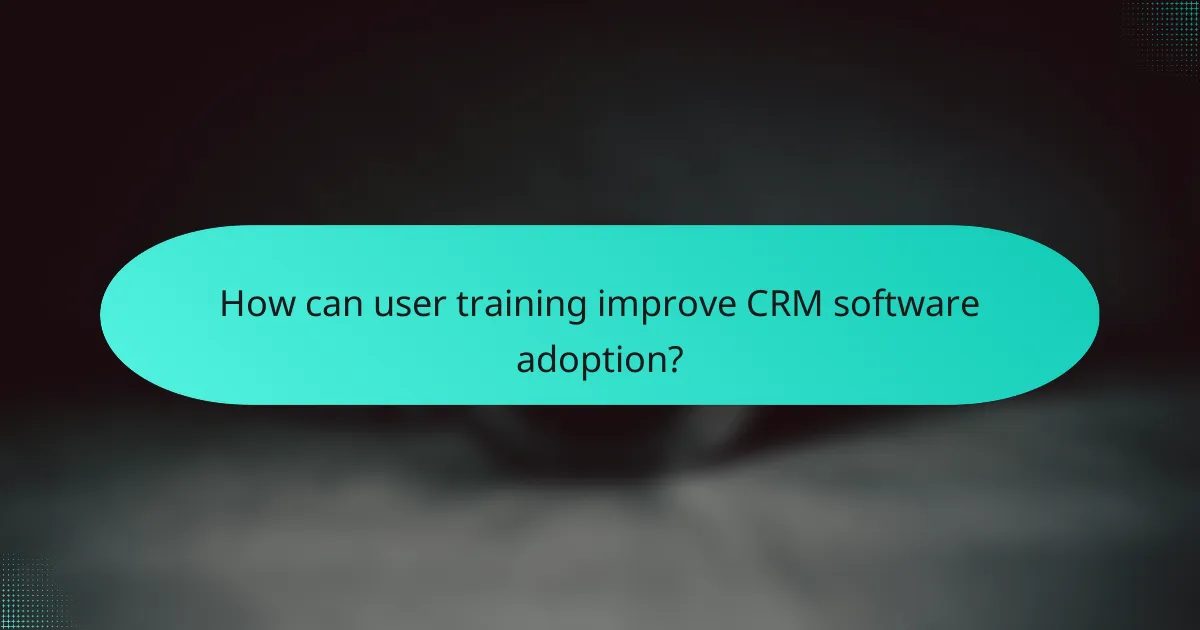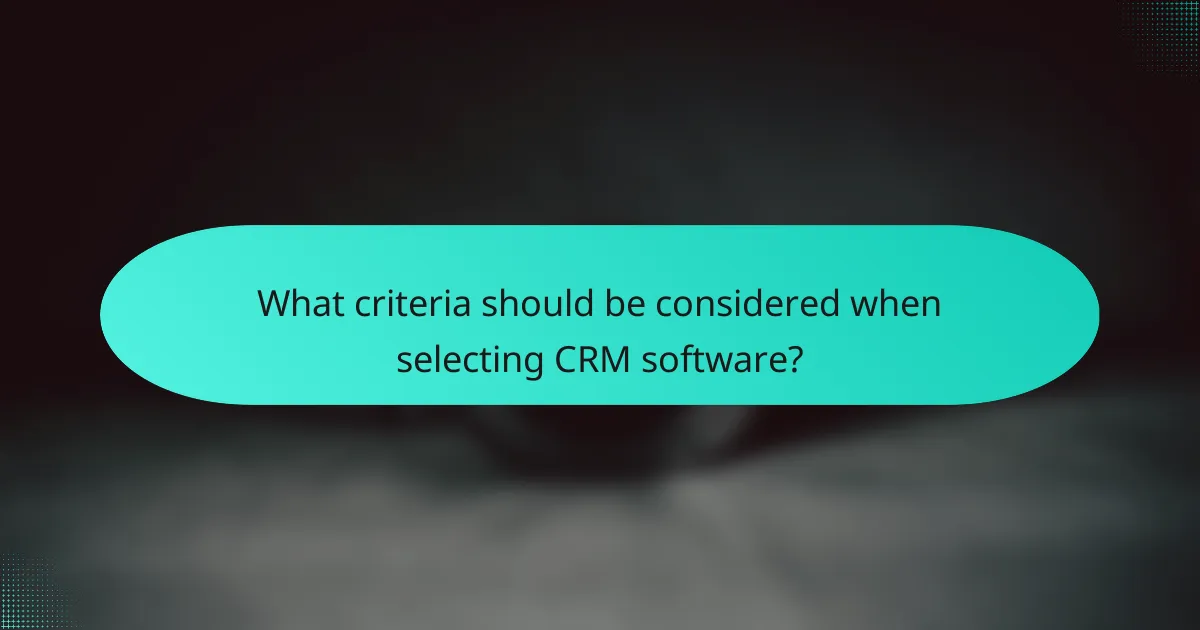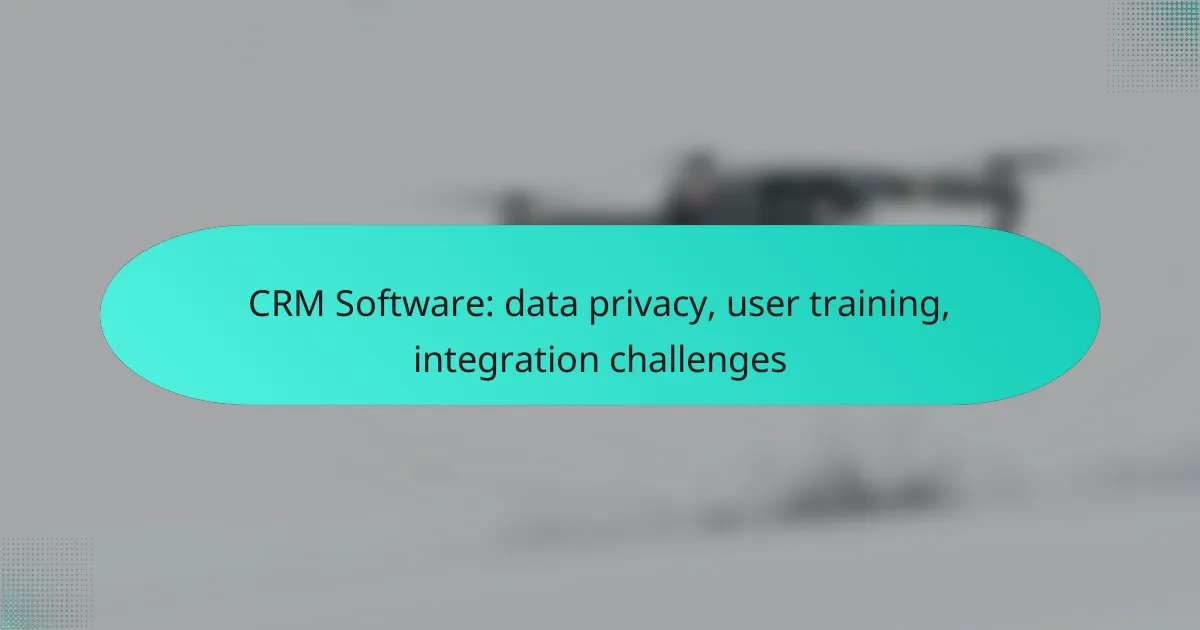Effective CRM software is essential for businesses looking to enhance data privacy, streamline user training, and overcome integration challenges. Solutions like Salesforce and HubSpot prioritize compliance with privacy regulations while offering robust security features. Additionally, comprehensive user training fosters confidence and improves system adoption, ensuring better data management. However, organizations must also navigate common integration challenges to achieve seamless CRM functionality.

What are the best CRM software solutions for data privacy in Canada?
In Canada, the best CRM software solutions for data privacy prioritize compliance with regulations like PIPEDA and offer robust security features. Solutions such as Salesforce, HubSpot, Zoho CRM, and Microsoft Dynamics 365 provide tools designed to protect user data and ensure privacy.
Salesforce Data Privacy Features
Salesforce offers comprehensive data privacy features that include encryption, access controls, and audit trails. Users can customize permissions to ensure that sensitive information is only accessible to authorized personnel, which is crucial for maintaining compliance with Canadian privacy laws.
Additionally, Salesforce provides tools for data anonymization and the ability to manage consent preferences, allowing businesses to respect user choices regarding their data. Regular updates and security patches further enhance its reliability in safeguarding customer information.
HubSpot GDPR Compliance Tools
HubSpot includes various GDPR compliance tools that are also beneficial for Canadian users concerned about data privacy. These tools help businesses manage consent, track user data, and ensure transparency in data handling practices.
Features such as the ability to delete user data upon request and customizable privacy settings empower organizations to maintain compliance with privacy regulations. HubSpot’s user-friendly interface simplifies the process of managing data privacy, making it accessible for teams of all sizes.
Zoho CRM Security Measures
Zoho CRM implements strong security measures, including two-factor authentication, data encryption, and IP restrictions to protect user data. These features help businesses mitigate risks associated with unauthorized access and data breaches.
Moreover, Zoho provides detailed reports and logs that allow companies to monitor data access and usage. This transparency is essential for organizations aiming to uphold data privacy standards in Canada.
Microsoft Dynamics 365 Privacy Controls
Microsoft Dynamics 365 incorporates advanced privacy controls that align with Canadian data protection regulations. The platform offers features like data loss prevention, role-based access, and compliance management tools to safeguard sensitive information.
Users can easily configure privacy settings and generate compliance reports, which are vital for audits and regulatory checks. Microsoft’s commitment to data security is reflected in its regular updates and adherence to international standards, ensuring a secure environment for customer data.

How can user training improve CRM software adoption?
User training significantly enhances CRM software adoption by equipping users with the necessary skills and knowledge to effectively utilize the system. Comprehensive training reduces resistance to change, increases user confidence, and ultimately leads to better data management and customer interactions.
Interactive Training Modules
Interactive training modules provide hands-on experience with the CRM software, allowing users to engage directly with the system. These modules often include simulations and quizzes that reinforce learning and help users familiarize themselves with key features.
Consider incorporating gamified elements to make training more engaging. For example, users can earn points or badges for completing tasks, which can motivate them to explore the software further.
Onboarding Workshops
Onboarding workshops are structured sessions that introduce new users to the CRM software in a collaborative environment. These workshops typically cover essential functionalities and best practices, allowing users to ask questions and receive immediate feedback.
To maximize effectiveness, limit workshop sizes to ensure personalized attention. Aim for sessions that last between two to four hours, allowing ample time for hands-on practice and discussion.
Continuous Learning Resources
Providing continuous learning resources ensures that users can refresh their knowledge and stay updated on new features. This can include access to video tutorials, user manuals, and FAQs that are regularly updated to reflect software changes.
Encourage users to participate in online forums or community groups where they can share tips and ask for help. This peer support can enhance learning and foster a sense of community among users, further promoting CRM adoption.

What are common integration challenges with CRM software?
Common integration challenges with CRM software include data migration issues, API compatibility problems, and limitations with third-party integrations. These challenges can hinder the seamless operation of the CRM system and affect overall business efficiency.
Data Migration Issues
Data migration issues arise when transferring existing data into a new CRM system. Inaccurate data mapping or incompatible formats can lead to data loss or corruption, making it essential to plan the migration process carefully.
To mitigate these issues, conduct a thorough data audit before migration. Identify the data types, clean up unnecessary information, and ensure all data is in a compatible format. Testing the migration process with a small dataset can help identify potential problems early.
API Compatibility Problems
API compatibility problems occur when the CRM’s application programming interfaces do not align with other software systems. This can limit the ability to share data or automate workflows between platforms.
To address API compatibility, review the documentation of both systems to understand their capabilities. Consider using middleware solutions that can bridge gaps between incompatible APIs, facilitating smoother integration.
Third-Party Integration Limitations
Third-party integration limitations refer to the restrictions imposed by external applications when connecting to the CRM. Some applications may not offer robust integration options, which can hinder functionality.
Before selecting third-party tools, evaluate their integration capabilities with your CRM. Look for software that provides comprehensive integration support, including pre-built connectors or extensive API documentation, to ensure a more seamless experience.

What criteria should be considered when selecting CRM software?
When selecting CRM software, prioritize data privacy compliance, user training support, and integration capabilities. These criteria ensure that the software meets regulatory standards, provides adequate training resources, and can seamlessly connect with existing systems.
Data Privacy Compliance
Data privacy compliance is crucial when choosing CRM software, especially with regulations like GDPR in Europe or CCPA in California. Ensure the software has features that protect personal data, such as encryption and user consent management.
Look for certifications or compliance statements from the vendor that demonstrate adherence to relevant data protection laws. Regular audits and transparent data handling practices are also indicators of a trustworthy CRM solution.
User Training Support
User training support is essential for maximizing the effectiveness of CRM software. A good CRM provider should offer comprehensive training resources, including tutorials, webinars, and documentation to help users understand the system.
Consider whether the vendor provides ongoing support, such as live chat or dedicated account managers, to assist with any questions or challenges that arise during implementation and beyond. This can significantly reduce the learning curve and enhance user adoption.
Integration Capabilities
Integration capabilities determine how well the CRM software can work with other tools and platforms your organization uses. Look for software that offers APIs and pre-built connectors to popular applications like email marketing tools, accounting software, and e-commerce platforms.
Assess the ease of integration; some CRMs may require extensive customization, while others offer plug-and-play solutions. A CRM that integrates smoothly can streamline workflows and improve data consistency across your organization.

How does data privacy impact CRM software selection in Canada?
Data privacy significantly influences CRM software selection in Canada by necessitating compliance with local regulations and fostering consumer trust. Businesses must choose CRM systems that not only protect customer information but also align with the expectations of Canadian privacy laws.
Regulatory Requirements
In Canada, the Personal Information Protection and Electronic Documents Act (PIPEDA) governs how businesses must handle personal data. Organizations must ensure that their CRM software complies with these regulations, which include obtaining consent for data collection and providing individuals with access to their information.
When selecting CRM software, consider features that facilitate compliance, such as data encryption, audit trails, and user access controls. Regularly reviewing software updates and vendor practices is essential to maintain compliance as regulations evolve.
Consumer Trust Factors
Data privacy plays a crucial role in building consumer trust, particularly in Canada, where individuals are increasingly aware of their privacy rights. Customers are more likely to engage with businesses that demonstrate a commitment to protecting their personal information through transparent data practices.
To enhance consumer trust, businesses should communicate their data privacy policies clearly and ensure that their CRM systems allow for easy opt-in and opt-out options. Regularly educating staff on data privacy practices can also help maintain a culture of trust and accountability within the organization.
